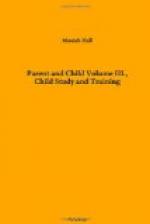Most good habits, on the other hand, are the result of conscious effort, especially on the part of parents and teachers. A reason for this is that the strongest instincts in children are those relating to self-preservation and the gratification of personal desires, hence selfishness, greediness, anger, and the fighting instinct are natural to the child, while generosity, good manners, respect for the rights of others, and sympathy require, in order to be properly developed, persistent effort and education. Parents, therefore, must persevere in training up the child in the way he should go if they would cultivate in him habits that bless his whole life.
Imitation also plays a remarkable part in the formation of habits. The child learns to walk, talk, use his hands in certain ways, and to eat, sleep, and dress after the manner of his elders. He uses good language or bad according to the examples heard; in fact, nearly everything a child does is the result of copying after others. Whether his habits be good or bad, efficient or slovenly, therefore, depends largely on the nature of the examples he has to follow.
LESSON VIII
QUESTIONS FOR DISCUSSION
1. How are habits formed?
2. Give examples to show that habit dominates most of the activities of life.
3. Why are good habits more difficult to form than bad ones?
4. Illustrate the power of imitation in the formation of habits.
5. What is the relation of habit to training and education?
6. What is the relation of habit to the skilled workman?
7. In what way can the expert increase efficiency in every vocation and profession?
8. How might much time be saved in the home and on the farm by the acquirement of effective habits in work?
Reference: For further study of habit see “Phillip’s Elementary Psychology.”
HABIT CONTINUED
Right Habits Must Be Acquired Early; Wrong Habits Are Broken Only Through Tremendous Effort
Whatsoever the parent desires in his child in the nature of attainment or skill, of character or ideal, if not foreign to the nature of the child, may be realized through attention to habit. But the training in right habits should be accomplished during the golden age of childhood when body and soul are plastic and impressions are easily made. Too early the character hardens like cement and thereafter becomes well nigh impossible to change. Think how difficult it is for the adult, but how easy for the child, to acquire skill in music, or facility in speaking a foreign language. With respect to moral virtue and spiritual sentiment, whatsoever good fruit you look for in the man usually appears as seed and flower in the child.
Among the habits that should be impressed early, habits that are absolutely essential to success in life, are the following:




